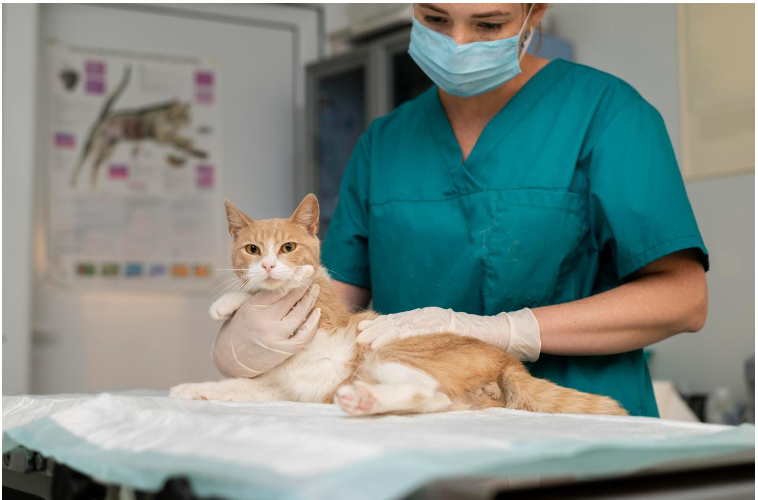Having good oral health is essential for animals, just as it is for humans. Yet, animals can face many dental issues requiring surgical intervention.
In this blog post, we'll discuss five common veterinary oral surgeries, covering their purposes and the potential risks involved.
From cats to dogs, horses to rabbits, these procedures play a crucial role in maintaining their oral health. Understanding these animal oral surgeries can help you, as a pet owner, make informed decisions when your beloved companion requires dental care.
Keep reading to learn in detail!
1. Tooth Extraction: A Common Veterinary Oral Surgery
Tooth extractions are one of the most common oral surgeries performed on animals. They are typically necessary when an animal’s tooth is severely damaged or infected, causing pain and discomfort.
In dogs and cats, fractured teeth from chewing hard objects or severe dental disease often require extraction.
Additionally, rabbits may need tooth extractions due to malocclusion, a condition where their teeth do not align correctly.
The primary purpose of this veterinary oral surgery is to:
- Relieve pain
- Prevent further complications
However, there are potential risks, including:
- Post-surgery infections
- Healing issues
According to Vet and Tech, an inclusive veterinary platform based in Orlando, FL, approximately 70% of cats and 80% of dogs exhibit signs of dental disease by the age of three. If left untreated, these conditions can result in severe disorders, tooth loss, and potentially serious systemic complications that impact vital organs such as the heart, kidneys, and liver.
2. Gingival Flap Surgery
In canines and felines, gingival flap surgery is often performed to treat advanced periodontal diseases.
This veterinary oral surgery involves lifting the gums to access the tooth roots and surrounding bone for:
- Thorough teeth cleaning
- Removal of infected tissue
By addressing periodontal disease promptly, veterinarians aim to:
- Prevent tooth loss
- Systemic health issues related to oral infections
Risks associated with gingival flap surgery include:
- Infection
- Poor wound healing
- Possibility of needing additional dental work in the future
3. Dental Bonding and Restoration
Dental bonding and restoration are vital for animals with dental trauma, such as fractures or wear from chewing on hard objects.
Horses, for example, may require dental restoration due to damage to their molars, which can affect their ability to chew and digest food properly.
Dental bonding and restoration aim to restore:
- Tooth's function
- Oral aesthetics
This veterinary oral surgery can significantly improve an animal's overall quality of life. However, there is a risk of complications such as infection or the need for future dental maintenance.
According to Atlanta Veterinary Dental Services, there are various dental restoration options available for animals. These options include dental fillings, root canal therapy, dental bridges, dental implants, and removable prosthetics.
4. Jaw Fracture Repair: A Complex Animal Oral Surgery
Jaw fractures, especially in cats and dogs, can result from:
- Accidents
- Falls
- Fights
Surgery is often necessary to realign and stabilize the fractured bones, allowing proper healing.
This procedure is crucial to:
- Restore normal jaw function
- Prevent long-term complications such as malocclusion or difficulty eating
Nevertheless, jaw fracture repair can be a complex procedure with potential risks, including:
- Post-operative infection
- Improper bone healing
- Need for additional surgeries to address complications
5. Salivary Gland Surgery
Salivary gland issues can afflict animals, leading to:
- Discomfort
- Inflammation
- Infections
In dogs, salivary gland mucoceles, which are cyst-like formations filled with saliva, may require surgical removal.
Salivary gland surgery aims to alleviate symptoms and prevent complications such as bacterial infections.
While this oral procedure is generally safe, there can be potential risks, including:
- Damage to nearby structures
- Post-operative swelling
- Recurrence of the mucocele
Important Guidelines for Pet Owners to Prevent Veterinary Surgeries
Here are some essential guidelines to prevent your pets from getting complications and having complex surgical procedures.
Regular Veterinary Care: Schedule routine check-ups with your veterinarian to monitor your pet's health and address any concerns promptly. Vaccinations, parasite control, and dental care should be part of the routine.
Balanced Nutrition: Provide your pet with a balanced and appropriate diet according to their age, breed, and size. To determine the right food, consult with your vet.
Exercise and Mental Stimulation: Ensure your pet gets regular exercise and mental stimulation. Playtime walks and interactive toys are essential to keep them physically and mentally fit.
Grooming: Regular grooming, brushing, bathing, and trimming are vital for your pet's hygiene and comfort. Long-haired breeds may require more extensive grooming.
Dental Care: Dental problems can lead to serious health issues. Therefore, maintain your pet's oral health by brushing their teeth and providing dental chews or toys.
Safe Environment: Create a safe environment for your pet, securing toxic substances and providing appropriate shelter and bedding.
Identification: Ensure your pet has proper identification, such as a collar with an ID tag and a microchip, to aid in their return if they ever get lost.
Following the above guidelines properly can help prevent your pet from having severe injuries and surgery.
To Wrap Up!
Veterinary surgeries in animals serve critical purposes in alleviating pain, improving oral health, and enhancing overall well-being. Pet owners and caregivers should work closely with veterinarians to determine the most suitable treatment options for their furry companions.
It's essential to follow post-operative care instructions diligently to monitor the animal's recovery from a veterinary oral surgery. Explore Vet And Tech's blog section for more guides on veterinary procedures and animal health solutions. They feature real-time information tailored to the needs of veterinarians and pet owners alike.
FAQs
When Would My Horse Need Dental Restoration?
For horses with damaged molars, dental restoration is required to restore proper chewing function and prevent digestive problems.
What Is the Average Cost of Salivary Gland Surgery in Dogs?
The average cost of salivary gland surgery in dogs ranges from $250 to $1,000. The actual cost will vary depending on several factors, including the gland's location, the dog's size, the surgery's complexity, and the veterinarian's fees.




